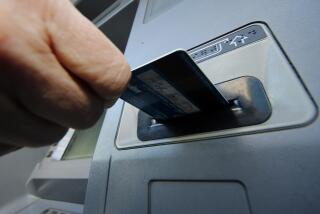Bank Trash Was Fodder for Check Counterfeiters, Police Say
- Share via
It’s a familiar scene.
A bank customer fills out a deposit slip, makes a mistake, and throws it in the wastebasket.
Another customer, in a hurry to cash his payroll check during the lunch hour, may leave behind a check stub.
Upstairs, in the loan processing department, a manager throws away a computer printout of the credit history of an applicant without running it through a shredder.
These daily scenarios abetted what Huntington Beach police have called a sophisticated check counterfeiting ring.
Cope said that counterfeiters have been going through the trash of at least three major banks, getting account numbers and names from documents, and creating counterfeit checks and driver licenses through a variety of processes. Three people were arrested in Huntington Beach on June 25 after police found bank documents and copier equipment in a camper truck. Police believe the suspects are part of a larger ring.
“The very existence of this ring depended upon a lot of valuable information being left out in the open,” Huntington Beach Police Sgt. Jeff Cope said.
He said the same caution consumers exercise in destroying credit card carbons to protect against theft should be extended to the checkbook.
“Today credit card customers are routinely given their carbons after making a purchase. Consumers guard their plastic much more safely than they do their checkbooks,” Cope said.
“Most people are not all that protective of their checking accounts,” said Steve Ledford, director of technical research for the Banking Administration Institute, a national technical and administrative banking association. “Most people feel that the actual check being lost is the only cause for concern. That’s major, but many other things carry account information too. Those have to be guarded also.”
Documents such as signature cards, deposit slips, personal checks, credit applications and various internal office memoranda were apparently discarded by at least three major banks--Wells Fargo Bank, First Interstate Bank and Security Pacific National Bank--and their customers. The alleged counterfeiters used the documents to gather account information and manufacture fictitious checks. These checks were then cashed at local branch offices.
Statewide, customers have lost at least $750,000. Spokesmen for Wells Fargo and First Interstate Bank said they would reimburse their customers for any losses. Security Pacific declined to comment on the case.
Bank officials contacted stressed that precautions normally integrated into their day-to-day schedules should have prevented abuse.
“Our policy is to render such documents--like deposit slips, loan applications, voided checks, et cetera--unusable once they have passed through our system,” said John Popovich, First Interstate’s director of public affairs.
“We have customer confidentiality on all levels,” he said, and mentioned that in the normal course of business such documents would have been run through a paper shredding machine.
Already, some institutions have said that security measures are being reconsidered.
“It’s a problem that we’ve been looking into for some time,” said Kim Kellogg, a public relations executive at Wells Fargo, referring to document disposal. “We’re trying to update our security procedures to adjust accordingly.”
Even putting the matter of trash disposal aside, both bankers and detectives were puzzled as to how confidential information such as balance records of major deposits and computer printouts of transactions were obtained.
“We almost would never throw items such as those described in the garbage in whole form,” Kellogg at Wells Fargo said. She mentioned that those items would almost certainly be shredded or mutilated in some fashion.
Other banks contacted made similar assertions. The police, however, feel that the quantity of documents found in the camper truck indicates an apparent breach of bank security.
“Complacency exists in any job,” Cope said. “And I’m certain that it exists in the banking industry just as it does in the police department or anywhere else.”
To guard against serious breaches of trust, First Interstate’s director of security, Edmund Pristy, said, “regular audits and investigations are conducted continuously.” He mentioned that if someone in a branch office of his bank weren’t following security procedures, the irregularity usually would be detected. “It does happen,” he said. “We just try to minimize its occurences.”
Aggravating the problem, police detectives have said, was a reluctance of the three major banks to ask the check counterfeiters for identification, or to compare signatures.
“In the cases that they were asked for ID, they were invariably shown a fake driver’s license,” Cope said. He noted that the quality of the fake identification was so poor that some tellers immediately called bank security.
Even if banks were to beef up security to prevent counterfeiting, customers would have to do their job in protecting their privacy too, bankers stressed.
“Obviously if someone comes in and makes a deposit, we can’t stop them from throwing their slip away,” said Mary Cox, a spokeswoman for Eldorado Bank, headquartered in Tustin.
More to Read
Sign up for Essential California
The most important California stories and recommendations in your inbox every morning.
You may occasionally receive promotional content from the Los Angeles Times.













